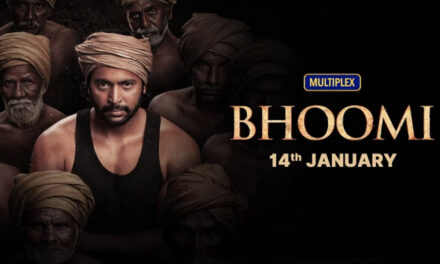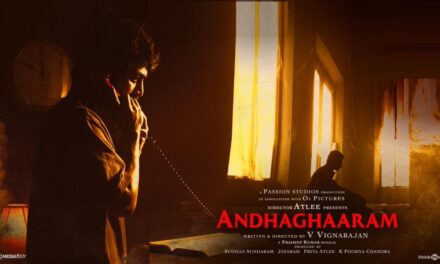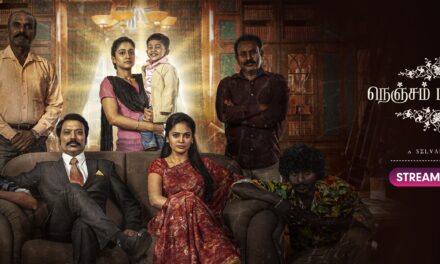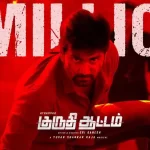Director: Vetrimaaran
Cast: Dhanush, Manju Warrier, Prakash Raj
‘Asuran’ opens with shots of Sivasami (Dhanush) wading across a swampy river in the dead of the night with his teenaged son Chidambaram, and it soon becomes apparent that they are bolting from town. There’s been a gory murder, and it’s not clear at first how Sivasami and young Chidambaram figure in the scheme of things. This reminded me of the opening sequence from ace director Vetrimaaran’s previous film Vada Chennai, which also opened with scenes of an apparent gory murder without actually revealing who had been murdered and why!
As we take a few steps back into the recent past, a voiceover apprises us of the core plot- that of land grabbing atrocities by Vaddakuran (‘Aadukalam’ Naren) and his brother Venkatesan (Pavan), and their eagerness to get hold of a small parcel of land belonging to Sivasami’s family as well. Sivasami and his wife Pachaiyammal (the terrific Manju Warrier), along with her brother played by Pasupathy, have no inclination of letting Vadakkuran have his way. This paves the way for petty taunts and blown up disagreements between the two groups and at one point, things get violent, courtesy Murugan, Sivasami’s elder son who is a hothead. Murugan’s intemperate, albeit justified actions put Sivasami in a spot and he is asked to apologize on Murugan’s behalf by way of an old, casteist ritual. This embarrassment doesn’t bode well with his sons though, and escalates into a series of acts where they try to avenge and retribute for their father’s humiliation. Unfortunately, all doesn’t go to plan and lives are lost. Sivasami, who in the eyes of his sons is just a coward and a drunk, has to dig into his seemingly secret past and muster up courage and resources to save what is left of his loved ones.
I don’t want to give away too many spoilers, but referencing some key plot points would be important to analyze how the film panned out. The core concept and story, based on the book Vekkai by Poomani, sound pulsating. However, I felt the execution left something to be desired, especially in the first half of the film. Take for instance the first real plot point, where Vaddakuran orders the brutal killing of Murugan. Though things had been boiling over for quite a while, the various triggers that led up to this act seemed quite trivial to me. Of course, there is a big casteist undertone here that we cannot ignore, but even then, I was not convinced on the need for this extreme step and the brutality of it. And let me not even go further into the shoddy CG work that was used to magnify the gore of the decapitated corpse! I felt similarly about Chidambaram’s actions that followed, to avenge his brother’s death. Again, on paper this idea sounded thrilling, but the execution was just super rushed. Apart from some tempo issues in the writing and editing, I felt the actors cast to play Murugan and Chidambaram were a little out of place and did not really leave an indelible impression. Casting is key when it comes to making revenge sagas work and I felt the film fell a little short in this regard.
The second half is when the film really picks up. And this is where we get the flashback that shows Sivasami in a different avatar altogether. In fact, his character sketch is not too different from the one Dhanush’s real life father-in-law Rajnikanth played in Baasha. I know this comparison is rather blasphemous but the similarities cannot be ignored! But coming back to Asuran, we learn how caste discrimination has again played a tragic role in Sivasami’s life. And the scenes in the flashback are much more profound than the earlier ones I’ve spoken about. Here, we really feel Sivasami’s anger, when his lover is paraded barefoot around town by a sleazy character, in another dated casteist and sexist ritual. What followed was a beautifully poignant scene where the same sleazy character now tries to hide behind women, in a bid to save himself from Sivasami who has come for revenge! This is Vetrimaaran’s brilliance in all it’s glory right here and probably what we missed a little in the first half.
Ultimately, Asuran is also a tale of a father’s sacrifice for his children. GV Prakash’s score does it’s bit to convey this emotion well and Velraj’s cinematography is terrific, especially in the low light takes which are shot in dense forests. I have not read the book by Poomani, so I’m unable to comment on if anything was lost in translation. With a little more consistency in writing and editing and some more conviction in the casting, this could have been an epic film. As it stands, the film is just about effective and manages to convey the most important message of all, that in his children’s eyes, Sivasami is now an angel!
Overall rating: 2.5/5









